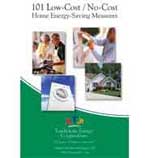Energy Tips
Don't overlook the simple stuff
Proper insulation, thorough caulking, programmable thermostats and more efficient appliances can reduce your energy expenses at home, but don't miss these no-fuss ways to conserve electricity and money:
- Use a microwave oven for most cooking. It uses less energy than an oven or range top and doesn't heat up your house either.
- Take a short shower instead of a bath. Showering reduces the amount of hot water you'll use. You can cut that amount even more by simply dialing back the hot water as you go along. That will have the added benefit of reducing the amount of heat and humidity in the home from a really steamy shower.
- Adjust the air conditioning unit's thermostat to a higher setting. One or two degrees will make a significant difference in cooling costs.
- If your water heater is above 120 degrees, which is considered the optimal setting, reduce it. Remember that many dishwashers now heat their own water, so there's no need to compensate.
- Turn off your water heater for any extended period away from home, such as vacation. Turn it on promptly when you return and you'll soon have hot water.
- Maintain correct temperatures in your refrigerators and freezers. Refrigerators generally should be set between 38 and 42 degrees Fahrenheit; freezers, between 0 and 5 degrees.
- Keep heating and cooling vents unobstructed. Don't let furniture or drapes block them.
- Clean or replace filters monthly.
- Install compact fluorescent bulbs (CFLs) in light fixtures used most often. Unlike standard incandescent bulbs, they don't put off as much light. CFLs use less electricity to create equal amounts of light. For instance, a 15 watt CFL can put out as much light as a 60-watt standard incandescent bulb. They cost more initially but last longer, saving money over time.
- Avoid over drying clothes. Consider using drying racks or, in good weather, clotheslines.
- Wash clothes in cold water. Use cold temperature detergents, in the directed amounts, and presoak before agitating. About 15 minutes of presoaking and 5 minutes of agitating gets clothes cleaner than 15 minutes of agitation only.
- Dress lighter. Advise family members to "lighten up," too. In addition to shorts and short sleeves, lighter-weight fabrics - and lighter-colored ones, too - can make a difference.
- Use drapes and blinds to block direct sunlight from entering your home. Drapes add a layer of insulation to keep cooler indoor air inside in hot weather, too.
- Turn off unnecessary lights. Get in the habit of turning off the light when you leave a room. It's simple and easy, like most of these tips, once you get the hang of it.
Investment tip: Insulation a good value
Looking for a sound investment strategy? Adding insulation is the most cost-effective means to reduce your home energy bills. You get a bonus dividend, too -- a more comfortable home.
Depending on the type and amount of insulation you add, you may need a professional's help. However, installing more insulation is something most handy people can handle. Some types of insulation are relatively simple to handle.
Insulating blankets can be purchased as precut pieces, called batts, or in rolls. Some have a paper or aluminum-foil facing, which serves as a vapor retardant. Blown insulation, made of cellulose (ground newspapers treated with boron) is also available. Foam insulation is increasingly popular, and can be purchased in rigid form, but be sure you investigate local building code requirements before installing.
Batts are the best bet for beginners. What will they cost? Depends. Insulation is rated by its resistance to infiltration, or R factor. Insulation rated at R-19 is running at about 41 cents a square foot; R-38 batts are 86 cents a square foot.
Source: Knight Ridder newspapersDon't wash about energy savings
Washing machines and water heaters are big energy users in most homes. Follow these tips to reduce your energy and water bills while getting the best performance of these workhorse appliances:
- Wash and rinse laundry in cold or warm water.
- Measure detergent carefully. Over-sudsing hampers the washing action.
- Wash only full loads or adjust the water-level control.
- Time-of-use consumers should wash clothes during off-peak hours.
Cleaner dryer brings leaner bills
Cleaning your dryer’s lint filter after each load helps maintain a good airflow, which helps the dryer work more efficiently.
Some lint will still get past the filter, however, and onto heating coils and hidden ductwork inside your dryer. This reduces airflow and can even cause fires, making a periodic cleaning a good idea.
First, unplug your dryer’s electrical connection. Do not plug it back in until you've completed the job.
Then, pull the dryer away from the wall and open the back of the dryer.
Use a soft brush and vacuum to clean the coils and ductwork. Do not use water, wet cloths or sponges.
Once you're done, reattach the cover and reconnect the power. You should see shorter drying times – and lower energy bills – with a properly maintained dryer.
Hairy beasts in house? Change filters more often
You clean or replace your air conditioner filters once a month, right? Good. It helps them work more efficiently. Now, answer this question: How does the filter look when you check it every month? If it's really dirty you may want to do the filter routine a little more often.
If you have indoor pets that shed a lot you might want to increase your filter schedule to every third week. (If your husband is going bald ... on second thought, we won't go there.)
Or, if your home is located in a dusty area, check that filter. Don't make your air conditioner work any harder than necessary.
Motion sensors make sense
Your electric cooperative offers several affordable, dependable options in outdoor lighting, either free-standing on a utility pole or attached to a building. Check with us if we can help.
Meanwhile, here's a related tip if you use one of your home's outdoor lights, such as the lights located at a front or back door, with the switch indoors:
Rather than leaving an outside light on all night, replace it with a light fixture equipped with a motion sensor. They're available at most home improvement stores. Screw-in adapters are also available that fit some existing light fixtures.
Give computer a good night's rest, too
After a long night of working at home, or just surfing the net, give your eyes and your computer a rest. Turn the computer off.
Remember, the monitor may go into screensaver mode, but that may not save much energy. To save the maximum amount of electricity and money, turn off the computer.
And, if convenient, disconnect your computer. Unplug the power supply as well as any telephone or cable TV lines that may be connected to it. Doing so will reduce the chance that a voltage surge can harm your computer.
At the very least, install a proper surge protector on your computer and other valuable home electronics. Check them regularly to make sure they're working properly.








